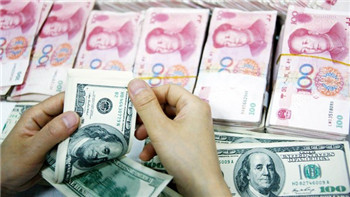(单词翻译:单击)

In December $108bn left China, with capital outflows marking an all-time monthly record. After adjusting for changing foreign exchange values, the outflow was an even more massive $126bn. China’s reserves have fallen about $700bn since the June 2014 peak of $3.99tn, the first annual decline.
去年12月,有1080亿美元的资金从中国流出,刷新单月资本外流的最高纪录。在根据外汇价值变动进行调整后,外流规模更是达到了1260亿美元之多。自2014年6月达到3.99万亿美元的峰值后,中国的外汇储备减少了约7000亿美元。中国外储首次出现年度下降。
Transitions are always dangerous times, and China’s shift to a more market-based forex regime seems particularly fraught. The tension has been seen in the increasingly wide gap — nearly a full percentage point before it converged abruptly yesterday — between the controlled onshore rate and the more market-determined offshore rate in centres such as Hong Kong (where renminbi deposits are down below 10 per cent of total deposits).
过渡期总是危险的,中国转向更多由市场决定的汇率机制的过程似乎尤其令人担心。受控的在岸人民币汇率与香港(其人民币存款占总存款比例已降至10%以下)等离岸人民币中心更多由市场决定的离岸人民币汇率的价差日益扩大——一度接近一个百分点,然后在周二突然收敛——就透露出了这种紧张气氛。
Concerns about the direction of China’s currency are understandable. The potential ripple effects of any plunge in the renminbi are significant, both for emerging markets in Asia and Latin America, and for developed markets.
对人民币走向的担忧是可以理解的。人民币一旦暴跌,潜在的连锁反应将相当大,不管是对亚洲和拉美的新兴市场还是对发达市场来说。
The central bank’s efforts to orchestrate an orderly and measured decline have probably already diminished Beijing’s buying of US Treasuries, and led to lower orders for US construction equipment and German cars. On a macroeconomic level, a weaker renminbi means deflationary forces globally will be more virulent, with the competitiveness of other markets undercut.
中国央行引导人民币有序、平稳贬值的努力,很可能减少了中国对美国国债的购买,并导致对美国建筑设备、德国汽车等海外产品的进口减少。在宏观经济层面上,人民币走弱意味着全球通缩压力变得更为危险,其他市场的竞争力被削弱。
Yet the panic is probably overdone, and a strong case can be made that the fall will be limited. Yes, the renminbi has started the year by weakening against a mostly strengthening US dollar, but it has suffered less against a trade-weighted basket.
然而,这种恐慌情绪很可能过头了。可以用一个强有力的论据来说明人民币下跌将是有限的。的确,人民币在今年开年后相对于基本上走强的美元下跌,但相对于贸易加权一篮子货币,人民币跌幅较小。
In recent years the redback has moved in tandem with the greenback as the latter has risen. Indeed just before the renminbi’s 1.5 per cent drop against the dollar last week analysts at Lombard Street Research in London estimated that it was 10 to 15 per cent overvalued.
近年来,人民币随同升值的美元一同上涨。事实上,在上周人民币对美元汇率下降1.5%之前,伦敦朗伯德街研究(Lombard Street Research)的分析师们就指出人民币被高估了10%到15%。
A few months ago, at its peak, the renminbi had strengthened 50 per cent against the yen. In recent days it has lost value against the Japanese currency. But that decline is nothing when contrasted with the appreciation of the past decade. The People’s Bank is justified in trying to move to a renminbi measured against a basket of currencies of its trading partners rather than against a dollar whose value is rising.
几个月前,人民币相对日元最高升值了50%。近些日子人民币相对于日元有所贬值。但与过去10年人民币升值的幅度相比,这种贬值根本不值一提。中国央行试图将人民币汇率的参考指标从不断升值的美元,转为由贸易伙伴国货币组成的一篮子货币,此举合情合理。
When China was growing more vigorously, the linkage to the US dollar mattered less. But as the mainland economy slows and with the US expected to strengthen, that nexus has become more of a challenge. The US is tightening monetary policy while China needs to ease. In real terms interest rates are way too high, and the burden of debt servicing for many cash-strapped enterprises is too heavy.
在中国较强劲增长的时候,人民币与美元的联系没有那么重要。但随着中国内地经济放缓和美国经济有望走强,这种联系更多成了一种挑战。美国正在紧缩货币政策,而中国需要放松货币政策。实际利率太高,许多资金紧张的企业偿债负担过重。
Moreover, precisely because interest rates were so high and dollar rates that much more attractive to borrowers, Chinese enterprises borrowed in the offshore dollar market. They are now prudently repaying that debt. In part this is the reversal of a carry trade that was profitable just two years ago — borrowing cheap dollars and putting them into more lucrative renminbi assets was widely regarded as a one-way, riskless trade.
此外,正是因为利率过高以及美元利率对借款者更具吸引力,中国企业之前在离岸美元市场借贷。他们现在很明智地在偿还这些债务。这有一部分是两年前还有利可图的套利交易的逆转——借入廉价美元,然后用这些美元买入更有利可图的人民币资产,这被普遍认为是一种单边的无风险交易。
But on top of that, every year citizens are allowed to buy $50,000 in foreign exchange. So since the new year many have done just that.
但除此之外,中国公民每年被允许购买5万美元的外汇。因此自新年以来,许多人都在购买外汇。
The renminbi is not a real international currency yet. After the new Argentine government lifted capital controls last month, leading to a fall in the peso, officials said they were selling their renminbi reserves. That was not because they expected the Chinese currency to plunge but because central bank intervention is still all about the dollar — the only true reserve currency.
人民币还不是真正的国际货币。举个例子,在阿根廷新政府上月解除资本管制、从而导致比索下跌之后,官员们表示,他们正在卖掉人民币储备。这不是因为他们预计人民币将会暴跌,而是因为央行干预仍然全都与美元有关——美元是唯一真正的储备货币。
But that will change in a few years, which is why the IMF has decided to include the renminbi in its special drawing rights, its international reserve asset. In time the renminbi will become a real international currency, with a heft commensurate with China’s weight in international trade. That means it will be a bigger part of international monetary arrangements, and its value will be underpinned by central banks.
但若干年后这种情况将会改变,这正是国际货币基金组织(IMF)决定将人民币纳入其国际储备资产——特别提款权(SDR)货币篮子的原因。有朝一日,人民币将成为真正的国际货币,产生与中国在国际贸易中的地位相称的影响力。这意味着人民币将在国际货币安排中拥有更大分量,其价值将得到各国央行的支持。
So while the renminbi is no longer a one-way upward bet, beware of being whipsawed in the year of the monkey.
因此,尽管投资者不再押注人民币单边升值,但要当心在猴年遭受双重损失。


